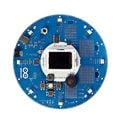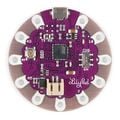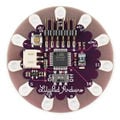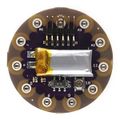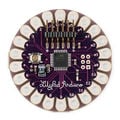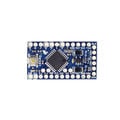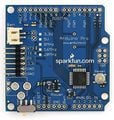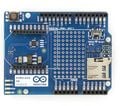
Arduino is a popular open-source hardware project that is a single-board microcontroller, designed to make the process of using electronics in multidisciplinary projects more accessible. The hardware consists of a simple open hardware design for the Arduino board with an Atmel AVR processor and on-board input/output support. The software consists of a standard programming language compiler and the boot loader that runs on the board.
Arduino Board Models[edit | edit source]
| Arduino | Processor | Frequency | Voltage | Flash kB |
EEPROM kB |
SRAM kB |
Digital I/O pins |
...with PWM |
Analog input pins |
USB Interface type |
Other I/O |
Release date |
|---|---|---|---|---|---|---|---|---|---|---|---|---|
| ADK | ATmega2560 | 16 MHz | 5 V | 256 | 4 | 8 | 54 | 14 | 16 | 8U2 | MAX3421E USB Host |
July 13, 2011[1] |
| BT (Bluetooth) | ATmega328 | 16 MHz | 5 V | 32 | 1 | 2 | 14 | 4 | 6 | None | Bluegiga WT11 Bluetooth | October 22, 2007[2] |
| Diecimila | ATmega168 | 16 MHz | 5 V | 16 | 0.5 | 1 | 14 | 6 | 6 | FTDI | October 22, 2007[3] | |
| Due[4] | AT91SAM3X8E | 84 MHz | 3.3 V | 512 | 0[5] | 96 | 54 | 12 | 12 | 16U2 + native host[6] |
2 DAC | October 22, 2012[7] |
| Duemilanove | ATmega168/328P | 16 MHz | 5 V | 16/32 | 0.5/1 | 1/2 | 14 | 6 | 6 | FTDI | October 19, 2008[8] | |
| Esplora | Atmega32u4 | 16 MHz | 5 V | 32 | 1 | 2.5 | 32u4 | Analog joystick, four buttons, several sensors, 2 TinkerKit inputs and 2 outputs, LCD connector | December 10, 2012 | |||
| Ethernet | ATmega328 | 16 MHz | 5 V | 32 | 1 | 2 | 14 | 4 | 6 | None | Wiznet Ethernet | July 13, 2011[9] |
| Fio | ATmega328P | 8 MHz | 3.3 V | 32 | 1 | 2 | 14 | 6 | 8 | None | March 18, 2010[10] | |
| Leonardo | Atmega32u4 | 16 MHz | 5 V | 32 | 1 | 2 | 14 | 6 | 12 | 32u4 | July 23, 2012[11] | |
| LilyPad | ATmega168V or ATmega328V | 8 MHz | 2.7-5.5 V | 16 | 0.5 | 1 | 14 | 6 | 6 | None | October 17, 2007[12] | |
| Mega | ATmega1280 | 16 MHz | 5 V | 128 | 4 | 8 | 54 | 14 | 16 | FTDI | March 26, 2009[13] | |
| Mega2560 | ATmega2560 | 16 MHz | 5 V | 256 | 4 | 8 | 54 | 14 | 16 | 8U2/16U2 | September 24, 2010[14] | |
| Nano | ATmega168 or ATmega328 | 16 MHz | 5 V | 16/32 | 0.5/1 | 1/2 | 14 | 6 | 8 | FTDI | May 15, 2008[15] | |
| Uno | ATmega328P | 16 MHz | 5 V | 32 | 1 | 2 | 14 | 6 | 6 | 8U2/16U2 | September 24, 2010[16] | |
| Micro | ATmega32u4 | 16 MHz | 5 V | 32 | 1 | 2.5 | 20 | 7 | 12 | November 8, 2012[17] | ||
| Pro Mini | ATmega168 | 8 MHz (3.3 V model) or 16 MHz (5 V model) | 5 V or 3.3 V | 16 | 0.5 | 1 | 14 | 6 | 6 | August 23, 2008[18] |
Gallery[edit | edit source]
External links[edit | edit source]
- Arduino project main page
- Arduino project forum
- Arduino the Documentary
- Arduino Shield List
- Arduino Cheat Sheet
- Full Arduino Book List
- Regularly updated Arduino tutorials
See also[edit | edit source]
References[edit | edit source]
- ↑ Arduino Blog- Arduino Ethernet, ADK Available for purchase
- ↑ Arduino Blog- Arduino Diecimila and BT reference designs now available.
- ↑ Arduino Blog- Arduino Diecimila and BT reference designs now available.
- ↑ Chirgwin, Richard (2011-09-20). "Arduino to add ARM board this year". The Register. Retrieved September 20, 2011. "Arduino [...] showed off the new version in time for the New York Maker's Faire, with a 96 MHz clock speed, 256 KB of flash memory, 50 KB of SRAM, five SPI buses, two I2C interfaces, five UARTs and 16 12-bit analog interfaces."
- ↑ atmel.com
- ↑ atmel.com
- ↑ Arduino Blog- Arduino Due is finally here
- ↑ Arduino Blog- Arduino Duemilanove
- ↑ Arduino Blog- Arduino Ethernet, ADK Available for purchase
- ↑ Arduino Blog- Arduino FIO presented at Uno Punto Zero
- ↑ Arduino Blog- Massimo Introduces Arduino Leonardo
- ↑ Arduino Blog- LilyPad Arduino and Arduino 0010
- ↑ Arduino Blog- Arduino Mega: bigger, more powerful, still blue.
- ↑ Arduino Blog- Dinner is Ready
- ↑ Arduino Blog- Arduino Nano: all-in-one design for breadboard use
- ↑ Arduino Blog- Dinner is Ready
- ↑ Arduino Blog- New Arduino Micro available
- ↑ Arduino Blog- Arduino Pro and Pro Mini







